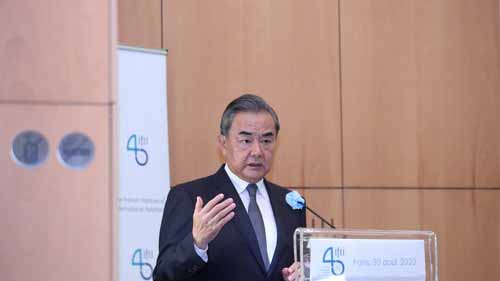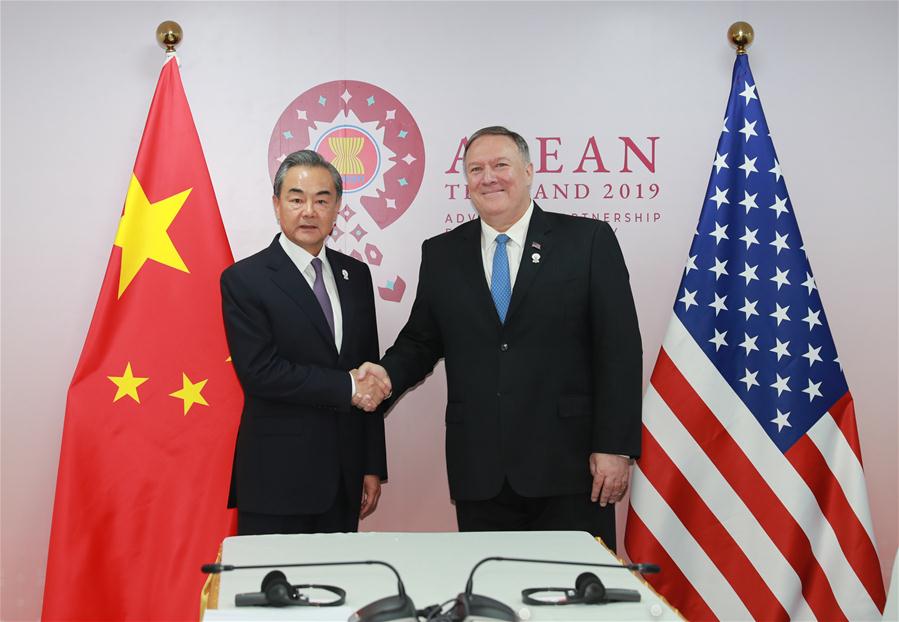02:15

In a speech on Sunday at the French Institute for International Relations in Paris, Chinese State Councilor and Foreign Minister Wang Yi called on Europe to unite against any movement inciting hatred and confrontation and stand "on the right side of history," referring to the unilateralism which the Chinese official believes is "the biggest challenge of international order."
Doing so could bring more "stability" to the complicated and fast-changing world, Wang said.
France is the fourth stop on the top Chinese diplomat's eight-day tour of Europe, which is also his first overseas trip since the COVID-19 epidemic has greatly eased in China.
Read more on Wang's Europe trip:
Wang Yi: China-Italy ties have withstood test of COVID-19
Wang Yi calls for speedy free trade agreement with Norway
Free trade and cooperation top Wang Yi's Netherlands visit
Human beings have never been so dependent on each other as they are today, Wang said in the speech, pointing out "unconventional problems" including climate change, cybersecurity, terrorism, cross-border crimes and the outspread pandemic. "China and Europe should be the models to push for global governance," he said.
"We should jointly oppose ideologies like 'my country goes first,'" Wang said, a clear rebuke to U.S. President Donald Trump's "America First" slogan. "And instead, build a community with a shared future for mankind."
Tensions between China and the U.S.
Noting that China does not and will not be the second United States, Wang said relations between Beijing and Washington have soured under the Trump administration after a slew of attacks.
President Trump and Secretary of State Mike Pompeo have accused China of a lack of transparency on its handling of the COVID-19 outbreak, with the president regularly referring to it as the "China virus." In trade, the Trump administration began increasing tariffs on imports from China – its largest trading partner – in 2018 as part of an ambitious plan to force Beijing to curb subsidies on state manufacturing. In technology, the U.S. Commerce Department has added Chinese tech titan Huawei to its "entity list" out of "national security concerns," an allegation Huawei has denied.

Chinese State Councilor and Foreign Minister Wang Yi (L) meets with U.S. Secretary of State Mike Pompeo in Bangkok, Thailand, August 1, 2019. /Xinhua
Chinese State Councilor and Foreign Minister Wang Yi (L) meets with U.S. Secretary of State Mike Pompeo in Bangkok, Thailand, August 1, 2019. /Xinhua
Last month, the Trump administration ordered China's consulate general in Houston to close – a significant escalation of tensions in already hardening relations between the two countries. In response, China called its abrupt move "a political provocation" and ordered the U.S. to shut its consulate in Chengdu.
And the list goes on.
For the senior Chinese diplomat, the conflict between the two superpowers stems from their different governing styles – China practices multilateralism, while the U.S. clings to hegemony and unilateralism.
"The world must have realized that it is the U.S. that stands on the wrong side of the history," Wang said. "We have never wanted to engage in a new Cold War with anyone."
China to continue on path of peaceful development
The foreign minister said China "will never seek hegemony," regardless of how much it develops, vowing that "China will continue to adhere to cooperative development."
According to Wang, China is set to expand imports while continuing to open up its doors to "bring along the recovery of world economy by its own recovery."
China's economy returned to modest growth of 3.2 percent in the second quarter of 2020, after the first-ever decline in decades. It seems its economy is rebounding as the epidemic eases domestically, thanks to the effective epidemic prevention measures. In light of the developments, the World Bank has upgraded China's economic forecast, attributing the reversion to its policies and speed in rolling out fiscal and monetary responses.
Read more:
Global CFOs more positive about China's economic outlook than the U.S.: Survey
"China's development benefits from friendly cooperation with countries around the world. We will continue to actively promote coordination and cooperation between major countries, strengthen friendship with neighboring countries, enhance unity and cooperation with developing countries, adhere to cooperation for security, cooperation for development, and cooperation to overcome challenges," Wang said in his 40-minute speech.
He also highlighted China's emergence from poverty – aided mainly by globalization – and said decoupling from China means risking the chance of economic growth.
For the past 10-plus years, the world's second economy has contributed over 30 percent to the global economy's growth, the foreign minister noted.
"Whether it's the 1997 Asian financial crisis or 2008 global financial crisis, China has played an essential lifting role in the regional and global economic recovery given its solid policies and robust economic foundation," he said.
As a promoter to globalization, China will continue to contribute to building an open world economy, he pledged.
(Cover: Chinese State Councilor and Foreign Minister Wang Yi speaks at the French Institute for International Relations in Paris, France, August 30, 2020. /Chinese Foreign Ministry)